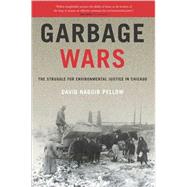Garbage Wars
, by Pellow, David N.- ISBN: 9780262661874 | 026266187X
- Cover: Paperback
- Copyright: 10/1/2004
In Garbage Wars, the sociologist David Pellow describes the politics of garbage in Chicago. He shows how garbage affects residents in vulnerable communities and poses health risks to those who dispose of it. He follows the trash, the pollution, the hazards, and the people who encountered them in the period 1880-2000. What unfolds is a tug of war among social movements, government, and industry over how we manage our waste, who benefits, and who pays the costs. Studies demonstrate that minority and low-income communities bear a disproportionate burden of environmental hazards. Pellow analyzes how and why environmental inequalities are created. He also explains how class and racial politics have influenced the waste industry throughout the history of Chicago and the United States. After examining the roles of social movements and workers in defining, resisting, and shaping garbage disposal in the United States, he concludes that some environmental groups and people of color have actually contributed to environmental inequality. By highlighting conflicts over waste dumping, incineration, landfills, and recycling, Pellow provides a historical view of the garbage industry throughout the life cycle of waste. Although his focus is on Chicago, he places the trends and conflicts in a broader context, describing how communities throughout the United States have resisted the waste industry's efforts to locate hazardous facilities in their backyards. The book closes with suggestions for how communities can work more effectively for environmental justice and safe, sustainable waste management.






